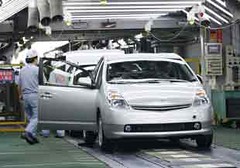
With indications that global warming is accelerating faster than many earlier computer models predicted, you would think that this information would spur a concerted global effort to reverse the trend. But so far the response of most governments around the world has been fairly tepid and the levels of greenhouse gas emissions continue to rise in those countries most responsible for the problem.
In a recent article for The Nation, A Global Green Deal, Mark Hertsgaard makes a case for a massive program of green investment to lift people out of poverty, stimulate the worldwide economy, and reduce greenhouse gas emissions.
Hertsgaard believes the Obama's stimulus package is a good start, but more most be done to contend with the problem.
The stimulus package is a good start. It contains $71 billion in direct green spending and $20 billion in green tax incentives, according to an analysis by the Center for American Progress. The World Resources Institute has calculated that every $1 billion in green spending generates approximately 30,000 jobs, so the green portions of the stimulus package should create about 2 million jobs, many in the construction sector, which has been hit especially hard. Retrofitting buildings, installing solar panels and constructing wind farms require skilled and semiskilled labor and create decent-paying jobs that cannot be outsourced. Investing in climate-friendly development in poor countries, where money buys more, should yield even more jobs and economic uplift--no small consideration, given the recent warning from the US director of national intelligence, retired Adm. Dennis Blair, that the economic downturn could become the gravest threat to international stability if it triggers a return to the "violent extremism" of the 1930s.
But even more will have to be done, at home and abroad, if we are to slash emissions quickly enough to preserve a livable planet. President Obama has promised to reduce US emissions to 1990 levels by 2020 and to 80 percent below 1990 levels by 2050. This sounds impressive compared with the Bush/Cheney years, but precisely because of Bush-era foot-dragging, the United States and the rest of the world need to achieve larger and faster emissions reductions than previously assumed. We have "a very short window of time," Rajendra Pachauri, chair of the Intergovernmental Panel on Climate Change, said in January at a Worldwatch Institute conference. If we want to avoid such scenarios as twenty feet of sea-level rise, which would put most of the world's big cities under water, the rise in global temperatures must be limited to 2.0 to 2.4 Celsius above preindustrial levels. That means global emissions must peak by 2015 and then fall rapidly for decades, said Pachauri. In this context, he added, Obama's goal "falls short of the response needed by world leaders" in preparation for the negotiations in Copenhagen in December to produce a successor to the Kyoto treaty. Instead, Pachauri urged Obama to embrace the European Union's target: reducing emissions to 20 percent below 1990 levels by 2020, which the EU says it will achieve by increasing energy efficiency and renewable energy by 20 percent.
The article then charts a course for a more effective approach to reducing greenhouse gas emissions, including techniques through which energy efficiency alone can produce substantial reductions in emissions while producing strong economic development.
The data and the incentives make it clear that there is no time left for dawdling. Fortunately, the actions that have the best chance to mitigate climate disruption are actions that also have the potential to revive a stagnant worldwide economy.
